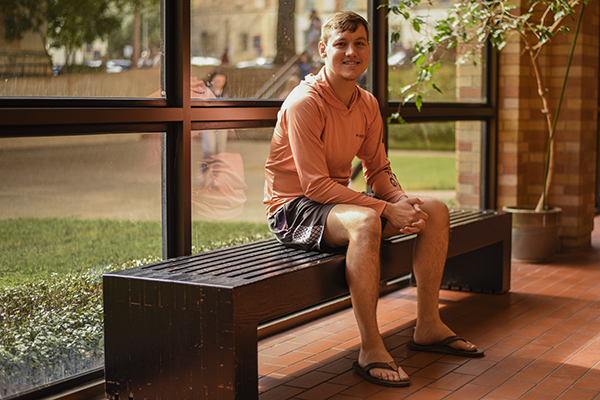When Mason Bettes was born, doctors told his parents he would die within 48 hours from kidney failure.
“Miraculously, his kidney started functioning,” said Bettes’ father, Robert Bettes. “I put him in his car seat at 10 days old, and I never looked back.”
Biochemistry sophomore Mason was born with one kidney and acute chronic kidney disease. Since birth, he has had blood tests every three months while also taking medicines to monitor its consistent function. But week before his summer classes started in July, his blood test results changed drastically. His kidney had failed.
“My mom woke me up early,” Mason said. “It was still dark in my room, and she seemed very panicked. My doctor had called and said my kidneys had basically no function. They rushed me to the (emergency room), and those couple days are really a blur.”
In August, Mason’s father was tested and matched with his son as a kidney donor. They will have kidney transplant surgeries on Dec. 18. at Methodist Hospital in San Antonio.
“I’d never really thought about it because all my life I’ve felt good — I’ve been normal,” Mason said. “In that hospital room, it finally became real. The one kidney had finally run its course.”
While in the hospital, Mason decided to still attend his summer classes, work part time in a cardiology clinic and take his full 12-hour course load in the fall semester.
In Austin, he did hemodialysis for five weeks at the El Milagro Dialysis Center, where he went for 12 hours per week. He then switched to peritoneal dialysis, which he does every night at home.
Nicole Turgeon, chief of abdominal transplant surgery at Dell Seton Medical School, said a machine filters toxins out of the blood during hemodialysis. She said peritoneal dialysis uses a catheter in the abdomen that infuses fluid to exchange out toxins.
“Often, young adults like (Bettes) aren’t ready for dialysis, but with a lot of support and understanding of this disease process, they can do it,” Turgeon said.
According to a diagnostic code report from University Health Services, only two students at UT have a registered diagnosis of chronic kidney disease, and neither are on dialysis.
Bettes said managing dialysis along with classes has overwhelmed him at times and made him feel isolated. Turgeon said missing even one dialysis treatment can have fatal repercussions.
“When I don’t get adequate dialysis, I feel like the walking dead,” Bettes said. “I feel tired, I can barely open my eyes and I’m toxin-overloaded. My brain is cloudy, and it’s hard to think.”
The dialysis became easier for him, however, once he learned his father was a match, and he could have transplant surgery, Bettes said.
“I was eating dinner … when I got a phone call from my nurse telling my dad he was a match, and we could have the surgery,” Bettes said. “I was ecstatic. When I finally got that date, I started writing the countdown in my room. Life became doable.”
Bettes’ father said he has a fear of medical procedures, but he wants to do everything he can to help Bettes.
“I’ll be honest, I’m terrified,” Robert said. “But I’ll tell you what I feel more than scared. I love my son. I want him to have a good, quality life, and I feel that this is going to make him feel 100% better again.”
Bettes said being on dialysis has helped him as a premed student. He said the transplant is scheduled for December, so he could finish the semester, and his father would not have to take off from work.
“It is frustrating, but I’m optimistic that it’s for a purpose,” Mason said. “Seeing what a patient has to go through … You can’t really teach that. You can only experience it, and I can’t wait to walk out of my (organic chemistry) final on the 16th, get in my car and drive to San Antonio.”





















